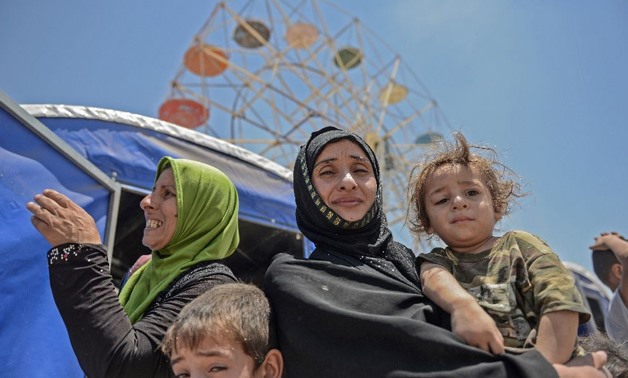
A displaced Iraqi family pose at a temporary camp in the compound of a hotel - AFP/MOHAMED EL-SHAHED
Mosul (Iraq) -18 June 2017: The Ferris wheel has long stopped spinning but the screening centre set up at its foot sees a constant stream of Iraqis fleeing the battle for Mosul and determines their fate.
Haggard-looking men sit on nearby bumper cars and others on the ground in the shade, waiting anxiously for army officers to call out their names.
The small fairground lies at the end of a pontoon bridge across the Tigris recently opened to civilians that is the only physical link between the two banks of the river.
"Everyone who crosses to the eastern side has to go through here," said Air Force Brigadier General Jabbar Mustafa, who is in charge of the screening centre.
"There are medical tents here for the families and the men have to be checked against our database before they can move into eastern Mosul," he explained.
Most of the recent arrivals are from Shifa, a neighbourhood on the west bank of Mosul where Iraqi forces backed by Western jets and advisers are battling some of the last members of the Islamic State jihadist group in the city.
Some of the men are immediately designated as IS members or supporters and taken aside, their hands tied behind their backs with plastic cuffs.
Among them that day were two Egyptians, whose nationality made them suspects.
According to Iraqi officers, the majority of the few hundred jihadists defending their last redoubt in Mosul's Old City are foreigners.
Men in the crowd will sometimes volunteer "information" incriminating one former neighbour or exonerating another.
One of the two Egyptians was described as a jihadist sympathiser and the other, who several people said had worked as a butcher in Mosul for 30 years, was released.
"The foreigners in IS stay to fight until the end but the Iraqi IS supporters blend back into the population," said Salah Mohammed, who fled Shifa the day before but came back because he had lost his ID card.
"It's not hard for (IS supporters) to slip through the cracks of such a screening process," he said, scratching tufts of hair he missed when he sheared off the long beard men were forced to wear under jihadist rule.
- Less than foolproof -
Mustafa, the officer in charge, said they detain 10 to 15 suspected IS members or supporters each day at the centre.
Meanwhile, officers and medics were tending to a mute mother, struggling to convey her situation and whose six children looked very dirty and distraught.
Her husband was not with her and her sign language account of what had happened to him was confused.
The best hint the centre's staff got was that the youngest of her sons, aged about 18 months, was named Abu Bakr, which they took as an indication of the father's allegiance to IS supremo Abu Bakr al-Baghdadi.
"If citizens don't help the security forces, then they can't know who they are," said Major Maan Mahdi of the army's 16th Division, admitting that the screening process was less than foolproof.
But he insisted it took many converging accounts from displaced residents to decide on somebody's fate and said that most displaced people were screened more than once.
For eight months now, Mosul has been the biggest battlefield Iraq has known in years, but the city's population has never dipped below one million.
Most residents of eastern Mosul stayed put when the operation was launched on October 17 last year and some have already returned to retaken neighbourhoods on the west bank, despite extensive destruction there.
Even before the floating bridge was built, the population never stopped moving across the city.
Next to the fairground-turned-screening centre, the Nineveh hotel -- a Mosul landmark with its truncated pyramid shape -- has also seen different waves of occupants.
Once considered one of Iraq's best hotels where former dictator Saddam Hussein would host his officers, IS took it over when it overran the city in 2014, renamed it "Waritheen" (inheritors) and used it for its own elite.
US and French special forces, and elite Iraqi fighters from the Counter-Terrorism Service have all stayed there over the past months, as evidenced by the different types of food rations and other objects they left behind.
The battle moved across the river and the hotel is now empty, waiting for its next masters.


Comments
Leave a Comment